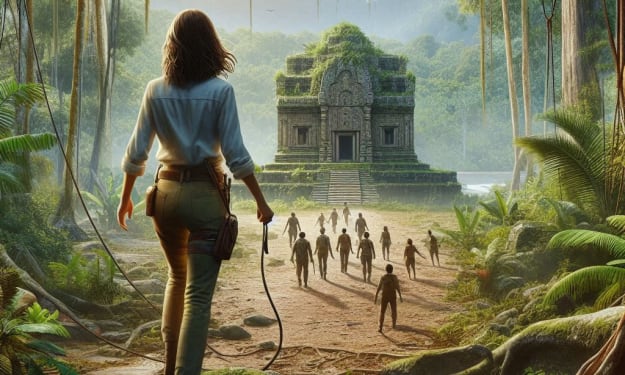What If People and Fish Changed Places?
A World Turned Upside Down

Imagine a world where the laws of nature are rewritten, where humans take to the seas as aquatic creatures, and fish inhabit the land. The very foundations of life as we know it would be completely upended. In this intriguing thought experiment, we explore the hypothetical scenario of people and fish swapping places. From the challenges of adaptation to the profound ecological transformations, let us dive into this extraordinary reversal of roles.
I. The Adaptation Struggle:
1.1. Human Evolution in the Water:
Humans, being air-breathing creatures, would face formidable challenges in transitioning to an underwater existence. Our physical bodies would require significant adaptations to survive in the marine environment. Gills would need to replace lungs, and our limbs would undergo modifications for efficient swimming. The development of streamlined bodies, webbed fingers and toes, and improved sensory organs would be essential.
1.2. Fish Confronting Terrestrial Life:
Fish, on the other hand, would face a similar struggle adapting to life on land. Their bodies, optimized for buoyancy and swimming, would need to undergo dramatic changes. Evolution might favor the development of limbs or appendages for locomotion and modified respiratory systems to extract oxygen from the air. Over time, fish may evolve to thrive in new terrestrial habitats.
II. Ecological Transformations:
2.1. Human Impact on Marine Ecosystems:
With humans now residing in the oceans, the marine ecosystems would undergo profound changes. Fishing practices would undoubtedly transform, as our new aquatic existence would necessitate alternative means of sustenance. The delicate balance between predator and prey would be disrupted, potentially leading to unforeseen consequences for marine biodiversity.
2.2. Fish as Land-Dwelling Species:
As fish populate the land, they would find themselves in vastly different ecosystems. The newfound abundance of insects, plants, and small animals would open up a wide array of food sources. Fish would evolve to fill new ecological niches, leading to the emergence of unique land-dwelling species. Predation patterns and competition for resources would reshape terrestrial ecosystems.
III. Societal and Cultural Shifts:
3.1. Underwater Human Societies:
Human civilizations would form beneath the ocean's surface, creating intricate underwater cities and societies. Architectural designs would change, adapting to the pressures and conditions of the deep. Communication methods would shift to accommodate an aquatic environment, with visual cues and sonar-like systems playing a crucial role. Technologies would be developed to enable humans to navigate and explore the vast underwater world.
3.2. Fish as Sentient Beings:
With fish now roaming the land, their newfound sentience would spark fascinating developments. Evolution might enhance their sensory abilities, enabling them to communicate and interact with their surroundings in unprecedented ways. Fish-based societies would emerge, showcasing unique cultures, art forms, and modes of expression. Humans might develop a newfound respect for these terrestrial fish, acknowledging their intelligence and beauty.
IV. Environmental Impact and Conservation:
4.1. Oceanic Conservation Efforts:
Humans' migration to the sea would undoubtedly heighten awareness and appreciation for marine environments. Ocean conservation efforts would become paramount, as we strive to protect our new aquatic habitats and the diverse marine life within them. Techniques like artificial coral reef construction and marine wildlife sanctuaries would become integral to safeguarding these newly adapted ecosystems.
4.2. Terrestrial Fish Conservation:
With fish now inhabiting land, the conservation focus would shift towards protecting their terrestrial habitats. Preserving wetlands, rivers, and lakes would be vital in ensuring the survival of these land-dwelling fish species. Conservation organizations and researchers would strive to understand their unique needs, ensuring their long-term survival and promoting biodiversity.
Conclusion:
The hypothetical scenario of people and fish switching places offers a fascinating exploration of the consequences that such a radical transformation would bring. The challenges of adaptation, the ecological transformations, the societal shifts, and the conservation efforts all form part of the complex tapestry of this extraordinary thought experiment. Although purely speculative, contemplating such scenarios allows us to reflect on the interconnectedness of ecosystems, the fragility of our planet, and the incredible adaptability of life itself.






Comments
Divine Dawn is not accepting comments at the moment
Want to show your support? Send them a one-off tip.